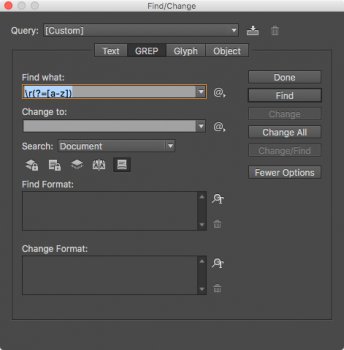Hi, does any one know a good grep formula in Indesign for removing paragraph breaks before lowercase letters, and replacing them with a space?
When I try it finds the lowercase letter, but highlights it also, meaning that the lowercase letter will also be replaced along with the paragraph break. Anyone know how to get it to just find the paragraph break?
Thanks
Simon
When I try it finds the lowercase letter, but highlights it also, meaning that the lowercase letter will also be replaced along with the paragraph break. Anyone know how to get it to just find the paragraph break?
Thanks
Simon


